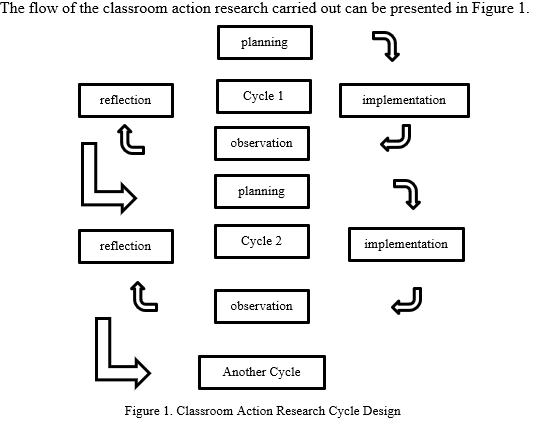Application of Problem-Based Learning Model to Improve Student Learning Outcomes in Biology Subjects
DOI:
https://doi.org/10.30736/seaj.v6i1.1022Keywords:
Natural Science Learning, Biology, learning outcomes, creative problem solvingAbstract
This study was conducted with the aim of improving student learning outcomes in biology subjects by using the Problem Based Learning (PBL) learning model in class X-6 SMA Negeri 2 Nganjuk. This type of research is a class action research (PTK). The subjects were students of class X-6 SMA Negeri 2 Nganjuk totaling 30 students. The PTK design includes planning, action and observation, and reflection. Data collection techniques used observation, tests, and documentation. Data analysis using comparative quantitative methods. The results showed an increase in the percentage of learning outcomes, namely in cycle I by 40%, while in cycle II by 60%. This was accompanied by an increase in the average student learning outcomes in cycle I of 73.01, while in cycle II it was 82.1. Thus it can be concluded that the use of the Problem Based Learning (PBL) learning model in learning biology can improve student learning outcomes.
Downloads
References
Ariyani, B., &; Kristin, F. (2021). Problem Based Learning Model to Improve Social Studies Learning Outcomes of Elementary School Students. Journal of Imiah Education and Learning, 5(3), 353. https://doi.org/10.23887/jipp.v5i3.36230
Asniadarni. (2018). Efforts to Improve Student Science Learning Activities and Outcomes through the Application of Problem Based Learning (PBL) Models. Diklabio: Journal of Biology Education and Learning, 2(1), 103–112. https://doi.org/10.33369/diklabio.2.1.103-112.
Gulo, A. (2022). Application of the Problem Based Learning learning model in increasing motivation and science learning outcomes. Educativo: Journal of Education, 1(1), 334–341. https://doi.org/10.56248/educativo.v1i1.58
Khusna, M., Sudaryanto, &; Dian, D. (2020). Application of Problem Based Learning (PBL) Model Based on Blended Learning to Increase Motivation and Learning Outcomes in Students. Proceedings of Teacher Professional Education, 1(2), 274–282.
Kusnandar, D. (2019). The influence of the problem-based learning model on cognitive learning outcomes and science learning motivation. MADRASCIENCE: Journal of Islamic, Science, Social, and Cultural Education, 1, 17–30.
Mayshandy, M. F., Mahardika, I. K., &; Budiarso, A. S. (2021). The influence of the problem-based learning model accompanied by a concept map on the motivation to learn science in junior high school class VII global warming material. Bioilmi: Journal of Education, 7(2), 101–109. https://doi.org/10.24114/inpafi.v3i1. 8028
Novika Auliyana, S., Akbar, S., &; Yuniastuti. (2018). Application of Integrated Thematic Learning in Elementary Schools. Journal of Education: Theory, Research, and Development, 3(12), 1572–1582. https://doi.org/10.17977/jptpp.v3i12.11796.
Pramudya, E., Kristin, F., &; Anugraheni, I. (2019). Increased activeness and science learning outcomes in thematic learning using Pbl. NATURALISTIC : Journal of Education and Learning Research Studies, 3(2), 320–329. https://doi.org/10.35568/naturalistic.v3i2.391
Rismawati, M. (2021). Factor Analysis of Student Mathematics Learning Difficulties During the Covid-19 Pandemic. Jakarta Journal of Mathematics Education Research, 3(2), 8–15. https://doi.org/10.21009/jrpmj.v3i2. 22262
Sholekah, A. W. (2020). Increased motivation and learning outcomes of science environmental pollution material through the PjBL model of grade VII students of SMPN 9 Salatiga. Journal of Mathematics and Natural Sciences Education, 10(1), 16–22. https://doi.org/10.37630/jpm.v10i1. 260
Sukmawati, R. (2021). Application of Problem Based Learning Model to Improve Mathematics Learning Outcomes Grade II SDN Wonorejo 01. Glosains: Indonesian Journal of Global Science, 2(2), 49–59. https://doi.org/10.36418/glosains.v2i2.21
Wahyuni, N. K. A., Wibawa, I. M. C., &; Sudiandika, I. K. A. (2021). Implementation of PBL (Problem Based Learning) Learning Model on Thematic Learning Outcomes (Lesson Content Indonesian). Scientific Journal of Teacher Professional Education, 4(2), 230–239. https://doi.org/10.23887/jippg.v4i2.36088

Downloads
Published
How to Cite
Issue
Section
License
Copyright (c) 2024 Imega Syahlita Dewi, Fitria Wahyu Ningtyas

This work is licensed under a Creative Commons Attribution-ShareAlike 4.0 International License.
Authors who publish with this journal agree to the following terms:
- Authors retain copyright and grant the journal right of first publication with the work simultaneously licensed under a Creative Commons Attribution-ShareAlike 4.0 International License that allows others to share the work with an acknowledgment of the work's authorship and initial publication in this journal.
- Authors are able to enter into separate, additional contractual arrangements for the non-exclusive distribution of the journal's published version of the work (e.g., post it to an institutional repository or publish it in a book), with an acknowledgment of its initial publication in this journal.
- Authors are permitted and encouraged to post their work online (e.g., in institutional repositories or on their website) prior to and during the submission process, as it can lead to productive exchanges, as well as earlier and greater citation of published work (See The Effect of Open Access).

This work is licensed under a Creative Commons Attribution-ShareAlike 4.0 International License.








